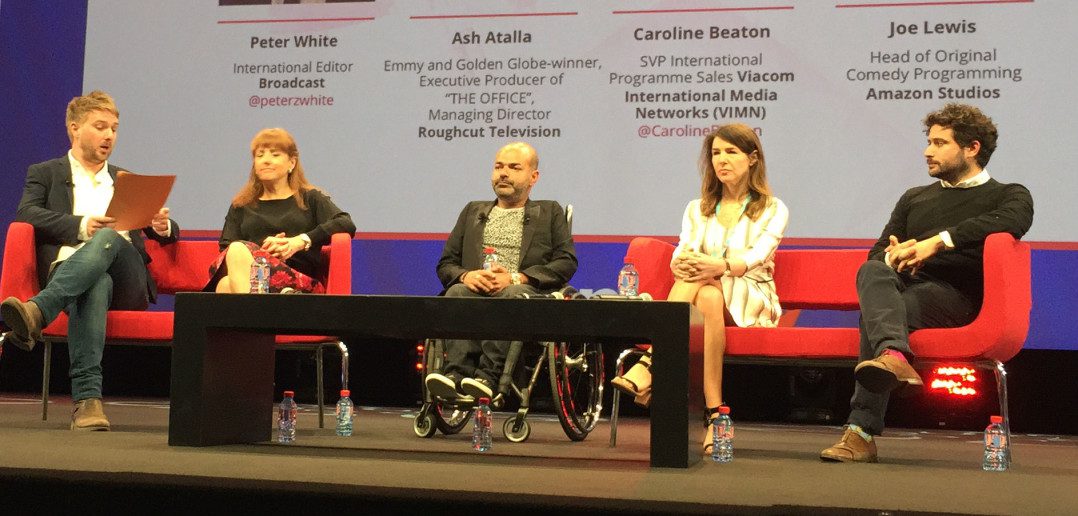Funny-bones were, predictably, tickled during this afternoon’s Comedy Masterclass session at MIPTV. But there was plenty of serious discussion of how comedy is finding new audiences through digital platforms and linear channels alike too, with a panel who should know. The Office executive producer Ash Atalla, of Roughcut Television was joined by Viacom International Media Networks’ (VIMN) SVP of international programme sales Caroline Beaton; Amazon Studios’ head of original comedy programming Joe Lewis; and VIMN’s SVP for comedy Jill Offman.
Moderator Peter White of Broadcast started by asking why comedy isn’t seen as something that travels well. « Perhaps a few years ago people thought that was the case, » said Beaton. « If you look at iconic shows like South Park or the Daily Show… but if you also look at many of the other shows like Modern Family and 30 Rock, they’ve been amazingly successful shows… It’s really been a couple of decades now that comedy has been becoming more and more transferable from market to market. »
Atalla said there are challenges with any comedy. « It’s just hard to make people laugh. It’s hard to make your friends laugh in a bar. It’s hard to make your family laugh. It’s hard to make one country laugh, so trying to make the world laugh is insane! » he said. « Probably the most British thing I’ve made is The Office, and The Office is the one that travelled. » He added that it’s a false starting point to develop a comedy specifically as something you want to take around the world.
« I try very hard to make my daughter laugh and I struggle, » said Offman, noting that Comedy Central is in 73 countries, with each of them thinking their humour is different to everyone else’s. « There’s certain things that make everybody laugh. Very sophisticated things like farting and falling over! Always good for a laugh everywhere… Physical humour travels. Verbal jokes are a struggle. The multi-camera sitcom with a laugh track works much easier than a single-camera comedy without a laugh track, because people need those cues. »
But she said producers have to make something that they really love, rather than over-worrying about how certain jokes will go down in overseas markets. « Sometimes someone will say ‘Oh, the Dutch won’t like that’ and I have to just go ‘LALALALA CAN’T HEAR IT!' » she joked.
Lewis talked about Amazon’s move into original comedy. « Our originals air in the UK and Germany on Amazon Instant Video, we’re on other networks in the world. We do worry about it travelling, but… to me what doesn’t work are these broad, local cultural stereotypes. A show about dating in LA I can’t imagine translating to other places… but if you look at a show like the British The Office, which I think might be the best comedy ever made… those characters all have real inner lives, and you want to find what happens next with all of them. »
For Amazon, it thinks of making five-hour movies, and then five-hour sequels if they prove popular: « The only way that works is if the characters have real inner lives: there’s no one there who just shows up, delivers a joke and leaves. » He talked about Amazon’s show Transparent, which has been a critical success, although Lewis declined to give viewing figures. » I have a Golden Globe on a $30 bookshelf in my office! And a $30 bookshelf is very expensive for Amazon, » he quipped.
Amazon is working on five or six half-hour series, three or four one-hours and a docuseries this year, with new shows going through its pilot process. « We air all our pilots publicly. We just put them up on Amazon Instant Video and they stay up there for four weeks, » he said. Amazon uses explicit feedback like reviews as well as tracking rewatch rates and other metrics to decide which should be commissioned as entire series. Lewis added that Amazon is willing to take pilots from around the world.
« You’ve seen as networks have scaled, the quality of the content has only scaled alongside that. It can be short-term thinking to just think about the US, » he said, noting that Amazon is working on a series filmed in France. « Where there might not have been chances 10 years ago to do shows filmed abroad… that’s what our pilot system and the global reach speaks to. »
« There’s never been a better moment to be doing what I do. I don’t mind where the show plays… the number of places we can take work to has exploded. And not only has it exploded, but – this is a cliché but by god – the world has become a smaller place for a company like mine… you have 30, 40, 50 places you can take a single project, » he said.
Offman was asked if Comedy Central has considered a similar pilot system to Amazon. « We’d love to try it: it’s nothing we’d rule out. It would be a lot less risky than airing it and crossing our fingers, which is the very scientific way we go about it now! » she joked. Atalla chipped back in on the « double-edged sword » of feedback. « You can have too much feedback very easily. When you get so many voices encroaching on what you’re trying to do you can lose your mind, » he said.
Atalla mentioned Twitter as « the most direct way » to get feedback from viewers. « I now get personal feedback from every bastard in the whole world who can contact me directly with their thoughts on our show! In truth, I kinda love it, and of course I absolutely hate it, » he said.
« There was a tweet last week saying ‘I wouldn’t wanna be Ash Atalla tomorrow morning, because he’s going to get fired’ after watching one of our shows. I thought that was quite humorous… Some of the most interesting work that has happened on planet Earth would never have made it through research. »
The conversation moved on to remakes, and The Office. Atalla noted that the US team « took the project on and it became, extraordinarily, a hit again in America », but joked that the UK team deliberately distanced themselves from it. « We just let them get on with it. It was a big surprise to us, but when it became a hit of course we were all over it! It was all us again… » He also noted that the show flourished in the US once the team « had the confidence » to take on their own stories, rather than following the original’s lead.
Beaton talked about Viacom’s approach to remakes: « We’re doing whatever it takes to remake that original with the same sorts of production values and authenticity, » she said, agreeing that the US The Office found its feet over several series. She pointed to Drunk History, which started as a big hit for Funny or Die online, and was then remade by Comedy Central as a popular show. « The streets of LA are lined with British pilots that never made it to series, » said Offman.
She also talked about the challenges for Comedy Central in developing shows in the UK. « Everybody wants comedy, there’s a huge amount of talent in the UK, but still not enough to go around. We go through hundreds and hundreds of scripts until we hear the right voice. And even then there’s a huge, laborious process, » she said. « We’re nurturing a lot of young writers, and that takes time. The younger generation of comic writers… are raised on American sitcoms in a way that Brits of 10 or 15 years ago would never have admitted to. They will sit there for 10 or 15 minutes and do riffs from Big Bang Theory. »
Offman talked about what she’s not looking for when producers pitch shows. « We don’t want 100 flat-share comedies, which is really what we get pitched. The next Friends, and the next Friends is what we don’t want. »
Atalla warned producers not to think a show can be a template for worldwide success: don’t get the same kind of actor to play the lead in a show that’s being remade in another country, for example. Not least because, in his view, American audiences still don’t want to watch British actors in comedies.
Lewis suggested that this may be changing because of the impact of VOD services. « If you’re on a service that’s archival, it might take longer to get people to watch it, but if you make something great, people will find it, » he said. « You’re gonna see a lot of things changing, and I think people will watch things that are different from them culturally. »
Check out MIPTV, MIP Digital Fronts, MIPDoc & MIPFormats 2015 full live coverage




